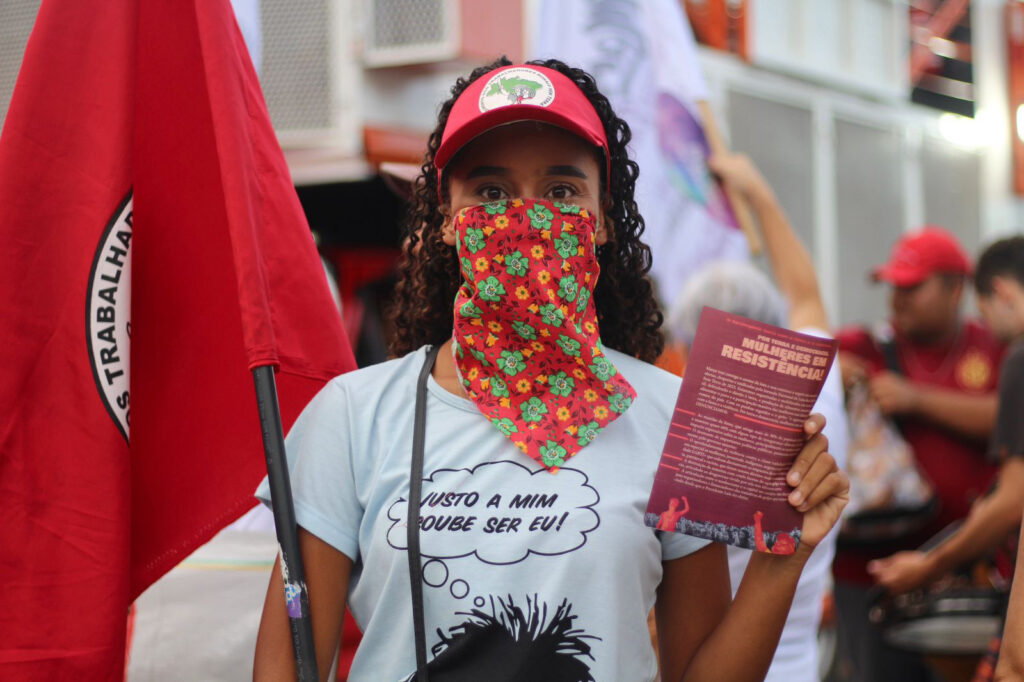Movimento dos Trabalhadores Rurais Sem Terra

The Largest Producer of Organic Rice in Brazil
The Milestone
As a result of the work being done by cooperatives in Movimento dos Trabalhadores Rurais Sem Terra (MST) that implement agroecological practices, MST has become the largest producer of organic rice in Brazil. In addition to contributing to the communities’ food needs, the rice is distributed nationally to public schools so that young people have more access to organic food.
Why This Matters
The consolidation of land and profits within the industrial food system has generated a preference for monoculture plantations, highly polluting synthetic nitrogen fertilizers, GMO seeds that directly threaten Indigenous varieties of seeds, and export-oriented agriculture that fails to meet local food needs and distorts food prices. Ecologically, this has led to a highly damaging global food system dominated by use of the top climate polluting industrial chemicals (synthetic N fertilizer), consuming 70% of freshwater while only producing 30% of the world’s food despite using 70% of the world’s agricultural land.
The development of agroecological practices and the proliferation of cooperatives are crucial antidotes to the harm that agribusiness continues to inflict on the environment and on communities. Broadening agroecological practices over the coming years has the potential to eliminate significant amounts of carbon dioxide from our atmosphere.
Movement Action
Central to MST’s visions for agrarian reform are labor rights, worker ownership, sustainable production, agroecology, and mutual aid. One of the ways that the movement manifests this is through a network of cooperatives that are run and controlled by peasants. This allows the movement to prioritize the production of nutritious and diverse foods free of synthetic inputs and GMOs; organize production and sales through a cooperative framework aimed at meeting the needs of communities; organize farm industries that are in the communities where peasants live; and increase, and protect, local and regional biodiversity.
How They Are Doing It
Technical Assistance: MST provides technical training on agroecology and cooperative economics to families living in settlements as a way to deepen technical skills and grow the movement.
Multidisciplinary: These trainings are offered by multidisciplinary teams made up of farmers, popular educators, researchers, and organizers who design and implement the trainings.
Cooperatives: Through cooperatives, MST communities put theory into practice by merging viable agroecological production with cooperative economic systems, so that they are producing healthy, diversified foods while providing a source of income for families.
Thousand Currents Partnership
Thousand Currents is one of MST’s only core, flexible, unrestricted funders. We have supported them to organize and participate in convenings, like the agroecology convening in 2020, attended by 3,500 women, and other partner-led agroecology learning exchanges across Brazil.
In 2018, Thousand Currents coordinated and recommended MST’s participation at a one-day workshop at the Sustainable Agriculture and Food Systems Funders Forum in the US. At the workshop, titled “The Intersections of Agroecology, Organics, and Regenerative Agriculture,” MST shared their work with key funders. During that same visit, we brokered connections with other funders, which resulted in successful funding opportunities for MST. We have leveraged resources for MST from other philanthropic institutions, often acting as a fiscal sponsor to ensure the resources reach them directly. Finally, Thousand Currents has offered emergency funding to MST over the years.
All Case Studies
Aliansi Masyarakat Adat Nusantara
Bufete para Pueblos Indígenas
Kenyan Peasants League
Nous Sommes La Solution
Southern Peasants Federation of Thailand
Thousand Currents Partnership Model

